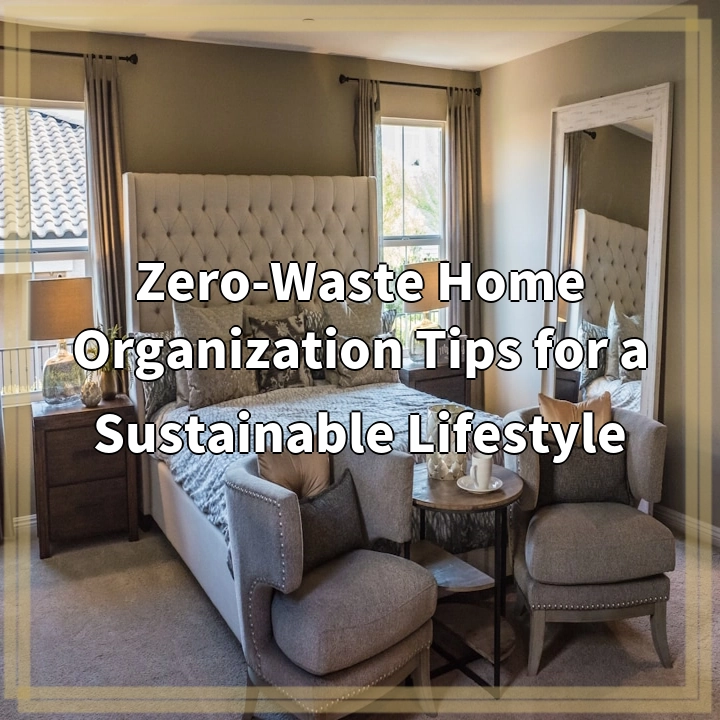
What it is:
Zero-waste home organization is a lifestyle approach that emphasizes minimizing waste and maximizing sustainability within your home. This method encourages individuals to rethink how they use, store, and dispose of items, shifting focus from waste generation to waste reduction. The goal is to create a living space that not only declutters but also promotes environmental responsibility.
At the heart of zero-waste home organization is the principle of the “Four Rs”: Refuse, Reduce, Reuse, and Recycle. By refusing unnecessary items, reducing consumption, reusing what you have, and recycling when there’s no alternative, you can significantly lower your household waste footprint. This approach often involves making mindful choices about purchases, utilizing bulk bins, and opting for products with minimal or sustainable packaging.
Real-world Problems:
Despite the many benefits of zero-waste home organization, there are significant real-world challenges that individuals face when trying to adopt this lifestyle. One major issue is the pervasive culture of convenience that prioritizes single-use items and disposable products. Many consumers are accustomed to convenience, which can lead to the over-purchase of low-quality items that are used briefly and discarded, contributing to escalating waste concerns.
Additionally, access to zero-waste options can be limited, particularly in low-income areas or regions where bulk stores and eco-friendly products are scarce. This creates a disparity in the ability to adopt sustainable practices and can make zero-waste living seem unattainable for many individuals. The lack of awareness and education around zero-waste principles further complicates the transition, as consumers may not understand the impact of their choices or how to effectively implement the lifestyle.
Lastly, the pressure to be “perfect” in the zero-waste movement can lead to feelings of guilt or inadequacy for those who are unable to meet those standards. This can discourage people from even attempting to make changes, as they may feel that any effort is insufficient compared to the all-or-nothing mentality often associated with sustainable living. These challenges highlight the importance of community support and accessible resources to empower individuals on their journey toward a zero-waste lifestyle.

Solutions for Adopting a Zero-Waste Home Organization
To overcome the challenges associated with zero-waste home organization, several effective solutions can be implemented. These solutions address the cultural, accessibility, and psychological barriers that individuals may face while striving for a sustainable lifestyle.
1. Embrace Mindful Consumption
One of the first steps toward zero-waste living is to adopt a mindset of mindful consumption. This involves thoroughly assessing purchases before acquiring new items, asking essential questions: Is this item necessary? Will it serve a purpose in my home? By being intentional about what we bring into our lives, we can effectively reduce waste and clutter.
2. Increase Access to Sustainable Options
Communities and governments can play a significant role in promoting zero-waste practices by increasing access to sustainable options. Supporting local businesses that offer bulk goods, second-hand shops, and products with minimal packaging can create a more eco-friendly shopping environment. Advocating for policies that encourage sustainable practices in retail can also empower consumers to make responsible choices.
3. Educate and Raise Awareness
Awareness campaigns are crucial for educating consumers about the importance of zero-waste lifestyles. Workshops, seminars, and online resources can provide valuable information and practical tips to inspire individuals to transition to a more sustainable way of living. Through social media and community engagement, the message of reducing waste can reach a broader audience.
4. Foster a Supportive Community
Building a supportive community around zero-waste living is essential for combating feelings of guilt or inadequacy. Online platforms and local groups can offer encouragement, share success stories, and provide practical tips for overcoming obstacles. Connections within the community can motivate individuals to make incremental changes without the pressure of achieving perfection.
5. Start with Small Changes
Finally, it’s important to emphasize that adopting a zero-waste lifestyle is a journey that doesn’t require perfection. Individuals should start with small, manageable changes that they can incorporate into their daily routines. Simple actions like using reusable bags, composting organic waste, and repurposing items can lead to significant positive impacts over time.















